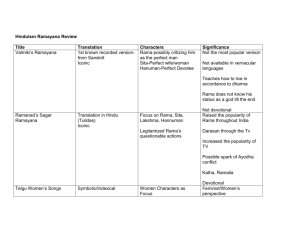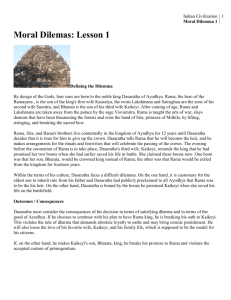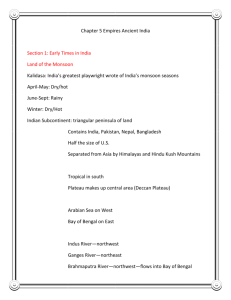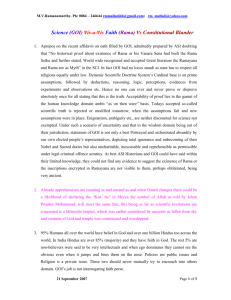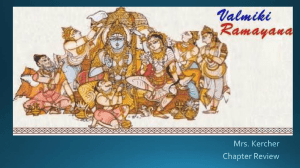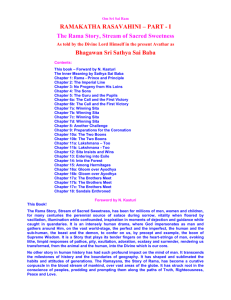trio king
advertisement
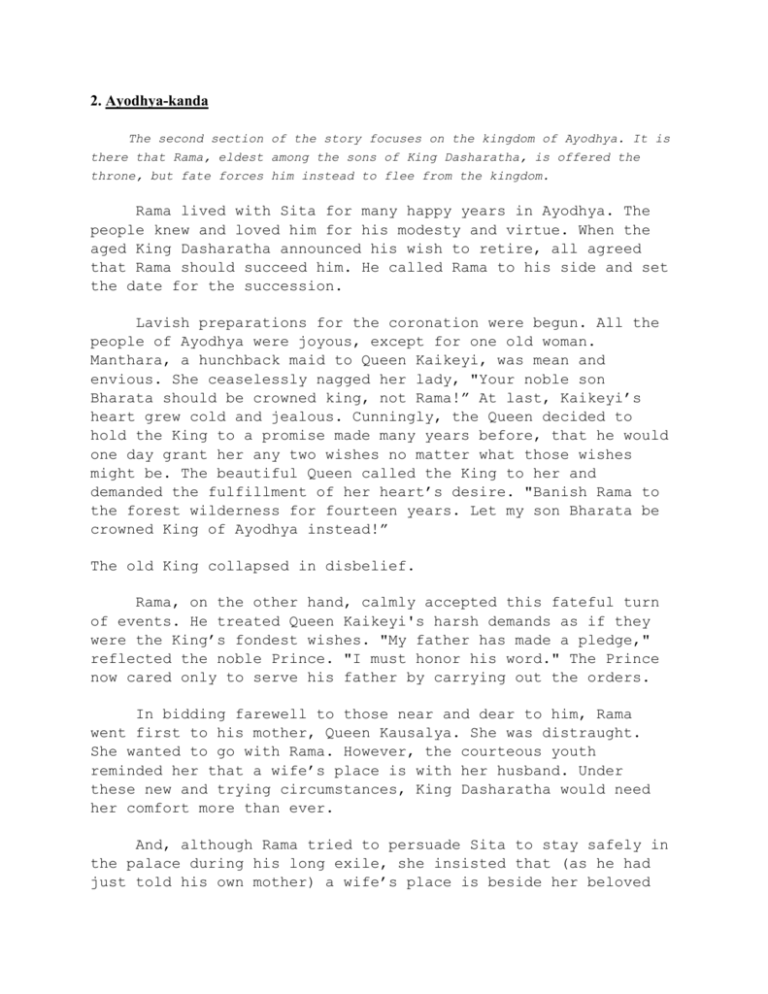
2. Ayodhya-kanda The second section of the story focuses on the kingdom of Ayodhya. It is there that Rama, eldest among the sons of King Dasharatha, is offered the throne, but fate forces him instead to flee from the kingdom. Rama lived with Sita for many happy years in Ayodhya. The people knew and loved him for his modesty and virtue. When the aged King Dasharatha announced his wish to retire, all agreed that Rama should succeed him. He called Rama to his side and set the date for the succession. Lavish preparations for the coronation were begun. All the people of Ayodhya were joyous, except for one old woman. Manthara, a hunchback maid to Queen Kaikeyi, was mean and envious. She ceaselessly nagged her lady, "Your noble son Bharata should be crowned king, not Rama!” At last, Kaikeyi’s heart grew cold and jealous. Cunningly, the Queen decided to hold the King to a promise made many years before, that he would one day grant her any two wishes no matter what those wishes might be. The beautiful Queen called the King to her and demanded the fulfillment of her heart’s desire. "Banish Rama to the forest wilderness for fourteen years. Let my son Bharata be crowned King of Ayodhya instead!” The old King collapsed in disbelief. Rama, on the other hand, calmly accepted this fateful turn of events. He treated Queen Kaikeyi's harsh demands as if they were the King’s fondest wishes. "My father has made a pledge," reflected the noble Prince. "I must honor his word." The Prince now cared only to serve his father by carrying out the orders. In bidding farewell to those near and dear to him, Rama went first to his mother, Queen Kausalya. She was distraught. She wanted to go with Rama. However, the courteous youth reminded her that a wife’s place is with her husband. Under these new and trying circumstances, King Dasharatha would need her comfort more than ever. And, although Rama tried to persuade Sita to stay safely in the palace during his long exile, she insisted that (as he had just told his own mother) a wife’s place is beside her beloved husband. Moreover, she remembered that long ago a fortune-teller had predicted that she would one day live in the forest. Accordingly, she offered to dress in the rough bark garments of forest wanderers. But the sight of the rough bark against her tender skin was too much for Rama, so Sita went with him dressed as usual. As for Lakshmana, he had already decided that he, too, must share the fate of Rama’s exile. Typically, he stood ready to serve his beloved brother. The trio left the city in the state chariot driven by a trusted royal servant, Sumantra. Crowds of grieving people followed on foot. Young and old, men and women, nobles and commoners were determined to follow Rama into exile rather than to endure the pain of separation from him. But Rama did not want them to suffer the hardships of forest life. So he managed to slip away from the people. When he, his wife, and brother came to within a stone’s throw of the neighboring country ruled by Guha, that monarch met them and asked them to stay in his kingdom. But Rama was eager to keep moving, and King Guha himself took the trio across the sacred Ganges River. At midstream, Sita saluted the Goddess Ganga, the watery spirit of the stream. She promised to visit someday the holy places along the banks of the river if the three of them should all return safely after the fourteen—year journey. Meanwhile, King Dasharatha had lost his will to live. The separation from his beloved son, Rama, was too much for him. He was crushed by the weight of his sorrow. One midnight, recalling a curse against him that he would die grieving for a son, his heart broke. He died in the tender care of Queen Kausalya. Brother Bharata, who had been sent away on an errand before all of this happened, returned to Ayodhya. Unaware of what had happened while he was gone, he was greeted by his mother, Queen Kaikeyi. She triumphantly told him how she had won the kingdom for him. To her surprise, the boy was angry and anxious. He paused only long enough to perform the proper funeral rites for his father, and then left in search of Rama. When he found his brother in the forest, Bharata begged Rama to return to rule the kingdom. Rama refused, declaring that even though their father was dead, his honor must still live on. He would, he said, gladly stay away from Ayodhya. That was the pledge Queen Kaikeyi had got from King Dasharatha. "And you must rule in my place, O brother," said Rama to Bharata. Bharata agreed to return to Ayodhya, but begged that he serve only as a humble regent for Rama. He asked Rama for his sandals. Bharata promised to place them on the throne as a symbol of Rama’s first right to rule. Because Bharata held Rama in such high esteem, he carried the sandals on his head all the way from the forest to the capital city. Once there, he placed the sandals in a shrine. Daily for the next fourteen years, Bharata bowed before them and acted as if Rama himself were there. Meanwhile, Rama, Sita, and Lakshmana moved ever farther southward on their journey. Along the way they paused at the hermitage of Atri, a famous sage, and his extraordinary wife, Anasuya. While Rama relaxed with Atri, Sita went inside with Anasuya. ~In private Sita was instructed by the blameless, penitent woman about how a wife should honor her husband. Sita was also rubbed with salves and ointments, and given a new set of clothes and some shimmering jewels to wear on the journey. The next morning, Rama and Sita, refreshed, joined Lakshmana. The three left the hermitage behind them, entering the Dandaka Forest "as the sun enters a mass of cloud.

